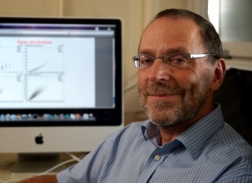Nationality: Russian
When he’s not being a tennis coach, taxi driver and all the other roles that go along with being a father to his very young daughter, Andrei Golutvin could be found at CERN where he served as spokesperson for the LHCb experiment during the period April 2008 – May 2011.

Andrei explains how the role of spokesperson is difficult to describe, “I have a clear vision of how an experiment should be prepared to start data taking. And I guess that my main role is to ensure that the right person is in the right position, and they communicate with each other well to make that vision a reality.”
It’s not the kind of role that springs to mind when you hear the job title spokesperson; Andrei actually fills a role more similar to a project manager “I also have to make sure that the interests of LHCb are maintained. The optimal accelerator conditions for LHCb are not necessarily the optimal conditions for other experiments such as ATLAS or CMS, so I have to defend the interests of LHCb.”
Andrei’s professional journey to CERN began long ago, however he couldn’t imagine doing anything other than physics; “I think it’s in my genes. My father was a physicist and I grew up in a very scientific atmosphere, I loved physics from a very early age.”
Born in Moscow, the influence of his father and his upbringing eventually led him to study at Moscow State University. His PhD concerned B physics – the study of particles made up of beauty quarks – which he describes as “one of the best subjects to be involved in at the time.”
He moved to Hamburg to work for the ARGUS project in 1982, where he spent eight years. At ARGUS he was involved in “quite a few high profile experiments” before switching to the SSC supercollider in Texas. The SSC had similar scientific goals to the LHC, measuring particles at high energy, however it was terminated in 1993 due to a lack of funds. By this point Andrei was a group leader, and moved back to Europe in search of experiments to work for.
Andrei was invited to serve on the LHCC committee whilst working on the HERA-B experiment in Hamburg. He reflects: “At the time LHCb was not a project, it was actually approved in front of my eyes, which, because of my background in B physics, was very exciting. This was the beginning of my life at CERN.”
He then sat on the scientific policy committee for six years, which was, “an exciting time. It was the middle of the 90s and there were big choices to make. All the big experiments were competing, and my job was to review the process of selection and to make some recommendations. It was an exciting role to have at that time.”
He describes his eventual move to LHCb as “really nice, as it was in some ways a continuation of my story with B physics. Plus, there were lots of developments to come, which would make my job very exciting, such as the discovery of the top quark.”
